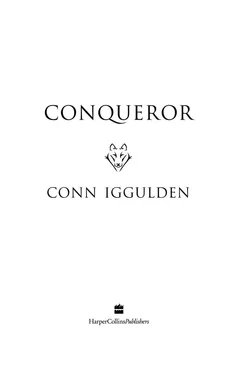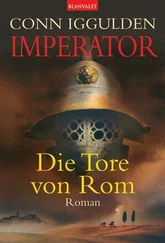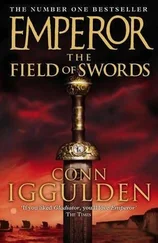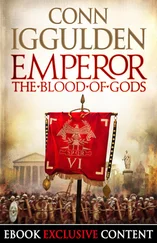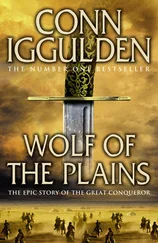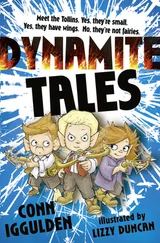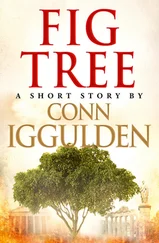‘You have given me more than I expected,’ Kublai said honestly. ‘Very well, brother. You have my oath. I will try to be the man you want.’ He held out his hand and Mongke gripped it in pride and satisfaction. Both of them were surprised at the strength of the other.
In the spring, the nation gathered on the plain of Avraga, deep in the ancestral homeland. The oldest men and women could still remember when Genghis had bound the tribes there, replacing their individual banners with just one staff of horse-tails, bleached white. The plain was vast and almost flat, so that it was possible to see for miles in any direction. A single stream ran through one part of it and Mongke made a point of drinking the water, where Genghis would have stood so many years before.
Batu had left his Russian estates to come with his honour guards, the image of his father, Jochi. He had been visibly distressed to find Sorhatani so wasted and thin, racked with a coughing illness that grew worse each day. Fevers came and went in her and there were times when Kublai believed she only hung on to life to see Mongke made khan.
From the west came Baidur, the son of Chagatai. His wealth was obvious in the gold he wore and the fine horses of a thousand guards. As khan of the homeland, Arik-Boke had arranged it all, so that they arrived over two months. One by one, the princes and generals rode in and made camp, until even that open plain was black with people and animals. Christian monks came from as far as Rome and France, and the princes of Koryo had travelled many thousands of miles to attend the man who would rule them. Until the last were in, the gathering traded and exchanged goods and horses, brokering deals that would make some rich and others poor for a generation. Airag and wine flowed freely and animals were slaughtered by the tens of thousands to feast them all.
When it was time, Mongke rode out among the host and they knelt to him and gave their oath. No one challenged him. He was the grandson of Genghis Khan and he had proven his bloodline, his right to lead. The bitter years under Guyuk were put firmly behind them. Kublai knelt with the others, thinking of the army he must take into Sung lands. He wondered if Mongke truly understood the challenge he had set. Kublai had spent most of his life in the city. He had honed his mind with the greatest philosophies of Lao Tzu, Confucius and the Buddha, but all that was behind. As Mongke became khan on a roar of acclamation, Kublai shivered, telling himself it was anticipation and not fear.
PART TWO

‘Fire is the test of gold; adversity of strong men.’
- Seneca
CHAPTER THIRTEEN

Suleiman was old, but mountains and deserts had hardened his flesh, so that sinews and narrow muscles could be seen shifting against each other under his skin. In his sixtieth year, his will remained strong, simmered down to diamond hardness by the life he had led. When he spoke, his voice was gently reproving.
‘That is not what I asked, Hasan, now is it? I asked if you knew who had stolen food from the kitchens, not if you had done it yourself.’
Visibly trembling, Hasan mumbled an unintelligible answer. He knelt on the stone floor before Suleiman’s great chair. His master was dressed in heavy robes against the pre-dawn chill, while Hasan wore only a grubby linen shift. In the shadow of mount Haudegan, the room saw the sun only in the afternoons. Until then, it could have been used to keep meat from spoiling.
‘Come closer, Hasan,’ Suleiman said, chuckling.
He waited until the man shuffled on his knees to the foot of the chair and then Suleiman snapped out his arm, backhanding him across the face. Hasan tumbled, pulling in his legs and hiding his head in his hands. Blood dripped from his nose and he looked in terrified silence at the shining drops. As Suleiman watched, the young man reached out with a finger and smeared a red line on the stones. His eyes filled with tears and Suleiman laughed aloud.
‘A few stolen cakes, Hasan. Were they worth it?’
Hasan froze, unsure whether the question held a trap for him or not. He nodded slowly and Suleiman tutted to himself.
‘I wish all men lied as badly as you do, Hasan. The world would be less interesting, but so many problems would simply vanish. Is there anything in that head of yours that understands you are not to steal from me? That I always find out and punish you? Yet still you do it. Fetch me my stick, Hasan.’
The young man looked at his master in abject misery. He shook his head, but he had learned it would only be worse if he refused. With Suleiman watching in amusement, he stumbled to his feet to cross the frozen room, feeling his bruised body protest. There were few days when he was not beaten. He did not understand why his master hurt him. He wished he had resisted the honeycakes, but the smell had driven him almost to madness. Over the years, Suleiman had broken too many of his teeth for him to eat without pain and the honeycakes were soft, dissolving on his tongue with something like ecstasy.
Suleiman patted the young man’s hand as Hasan gave him the stick. It was a walking cane with a weighted tip and a dagger blade hidden in the handle, suitable in all ways for the one who led the clan of Ismaili Assassins in Alamut. He saw Hasan was weeping and he put a thin arm around his shoulder as he stood.
‘Hush, lad. Is it the stick you fear?’ His tone was gentle.
Hasan nodded miserably.
‘I understand. You don’t want to be hit. But if I don’t, you will steal again, won’t you?’
Hasan didn’t understand and he looked blankly at the old man with his cruel, black eyes and scrawny face. Hasan was both younger and wider than Suleiman, his shoulders made powerful by endless labour in the gardens. He might even have stood taller if he straightened his back. Even so, he flinched when the old man kissed his cheek.
‘Better that you accept your punishment like a good boy. Can you do that for me? Can you be brave?’
Hasan dipped his head, tears spilling from his eyes.
‘That’s it. Dogs, boys and women, Hasan. They must all be beaten, or they are spoiled.’ Suleiman brought the stick round with a sudden snap, cracking it against Hasan’s skull. The young man yelped and fell back as Suleiman stepped closer, raining blows on him. In desperation, Hasan covered his face and Suleiman immediately hit him in the chest with his bony fist, at the point just above the stomach and below the breastbone. Hasan folded to the floor with a low groan, straining to suck in a breath.
Suleiman watched him affectionately, surprised to find he was panting slightly. Old age was a curse. He might have continued chastising the simpleton if his son had not chosen that moment to clatter up the stairs to the room. Rukn-al-Din barely glanced at Hasan as he strode in.
‘They have sent a response, father.’
Suleiman’s mood went sour at the words and he stood in thought, rubbing a spot of blood from the stick with his thumb.
‘And what do they say, my son? Will you keep me waiting?’
Rukn flushed. ‘They sent our man back unharmed, but the message is to abandon our fortresses.’
Suleiman gestured for Hasan to rise and handed the stick to him to be put away. It was odd, but he preferred the simpleton’s company to his own son at times, like a favourite hound. Perhaps it was that Hasan could never be a disappointment, as Suleiman expected so little from him.
‘Nothing else?’ Suleiman said. ‘No negotiation, no counter-offer? Has this khan’s brother, this Hulegu, given me nothing for the pains I have taken?’
Читать дальше
Конец ознакомительного отрывка
Купить книгу
